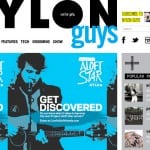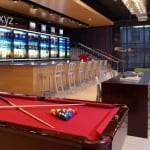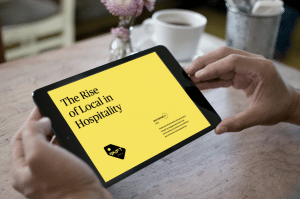Skift Take
Aloft Hotels was created with a 21st century-native mindset combining every next gen psychographic out there, which could become a blueprint for mid-market corporate hotel brands moving forward.
- Aloft Hotels brand positioning photo
- Aloft partners with Nylon mag
- Aloft partners with MTV Asia
- LIVE @Aloft
- Aloft Tulsa
- Aloft Baltimore Washington Airport
- Aloft Beijing, Haidian
- Aloft Cancun
- Aloft Bogota Airport
- Aloft London Excel
- Aloft Hotels’ Instagram
In the mid-2000s, Starwood Hotels wanted to recreate the success of its W Hotels brand in the select service market. The company first looked at existing hotel brands for any acquisition opportunities, but none fit the required parameters. So Starwood launched Aloft Hotels in 2008 from the ground up with the same focus on global lifestyle trends as W, yet at a lower price point for the mid-tier, highly-connected hotel guest of the future.
All of the Aloft Hotels brand pillars were clearly designed to answer what’s deemed today as Millennial/Gen Y demands, although Starwood executives won’t define the brand as such. It’s almost like, if you grabbed every hotel trend presently shaping the industry and threw them in a blender, the resulting cocktail would be Aloft.
The development pipeline is on target to surpass 100 properties by the end of 2014, which is very fast considering the global economic climate since 2008.
Previously the brand skewed heavily toward primary and secondary North American markets. Of late, there’s been a more even split among new openings in domestic cities, especially near airports, business communities and university neighborhoods, and international gateway destinations from Guadalajara to Guangzhou.
Another shift taking place is the style of hotel construction. During the first few years of Aloft’s development, all of the hotels were new-builds. In the last two years, there’s been an increase of adaptive reuse conversions in places like San Francisco, Tucson and Dallas’ historic Santa Fe Railroad terminal.
Among all of Aloft’s signature brand initiatives, the alignment with the music industry is the most prominent, such as a recent collaboration with MTV Asia. The hotel group also sponsors the twice-yearly Live in the Vineyard music festival in California wine country, attracting singers like Gavin DeGraw and James Blunt. And it partners with Nylon magazine on the Project Aloft Star competition where new artists have the chance to hook up with music industry execs.
That trickles down to the hotel level worldwide at Aloft’s w xyz bars and re: mix lounges, which host live acoustic performances by emerging local and national acts—branded LIVE @Aloft Hotels.
In 2013, Aloft partnered with the Design Within Reach modern furniture store to provide off-the-shelf and custom-built furniture and furnishings. Aloft Hotel’s unofficial tagline is “Style at a Steal.” The bespoke DWR collection includes a mix of 23 pieces including iconic Eames molded plastic chairs and Verpan stools.
Arguably the most significant Aloft Hotels innovation is in the tech/mobile arena. Presently, 14 U.S. properties offer mobile Smart Check-In via a single Starwood Preferred Guest RFID room key that allows guests to bypass the front desk at all 14 hotels completely.
We spoke with Brian McGuinness, senior VP for Starwood’s specialty select brands, for a deep dive into the Aloft story.
Skift: Who is Aloft Hotels for?
Brian McGuinness: Aloft is for the next generation traveler, someone who is an early adopter around tech, they’re self-expressors, and they’re very connected to music. Design is another passion point. Essentially they’ve grown up with the democratization of design through brands like IKEA or even Target, so their expectation of good design is important. And then there’s fashion, and their own style. So it isn’t about high fashion necessarily, it might be just wearing Levi jeans and an expensive shirt, but certainly they have their own style.
Lastly, I think what’s important is being authentic. Through social media they can recognize if you as a brand have the proof points to support your positioning, versus something that may be seen to them as non-organic.
Skift: How did W Hotels inspire the creation of Aloft?
Brian McGuinness: Six years ago, we had looked at potentially acquiring a brand so that we could get into the select service category of hospitality, which essentially means it’s not a full service hotel, so you wont typically find multiple restaurants, a spa, etc., in these hotels. We like to call it “specialty select,” which is delivering the right level of service to this customer, like high-speed internet access, free bottled water, you know, sort of a positioning of no nickel-and-diming.
As we looked at potential brands to acquire, we didn’t find one we liked, so we said okay, we’re going to create our own brand. When we thought about the passion points of our target customer—music, fashion, design—it aligned very nicely with the W brand, and the passion points for that brand. So we asked ourselves, how do we bring a W-like experience to this traveling customer at a price point that would be a little bit lower? So that’s how we ended up tying the two together to create the Aloft Hotels brand.
Skift: How has Aloft embraced the music industry as one of its key branding pillars?
Brian McGuinness: We are partnering either with larger bands and/or we are looking to local talent to actually perform in the hotels. We’ve sort of standardized our approach to it as well, whether it’s what the backline looks like so the artist has the appropriate sound, to how we set up the lobby experience, to the expectation of the customer from a corporate-wide perspective.
We’re also leveraging these twice annual music events, Live at the Vineyard, where you have everyone from Imagine Dragons, The Lumineers, Plain White T’s, etc. That experience will trickle down into the portfolio across the brand. So it’s a bit about creating that expectation for the customer that Aloft can be a destination in their market for live music.
From Live in the Vineyard, we said we would like to really give a platform for emerging artists to be able to get them recognition. One of the most surprising things for us when we were first doing the Live in the Vineyard was how many really passionate, talented people there were in the music theater, but yet it is very difficult to break through and/or get recognition.
Project Aloft Star was designed to give people a platform to actually submit some music, and with our contacts through Live at the Vineyard, we’re able to get it over to decision makers in the music industry. I think the first year we had about 15 to 20 entries, and last year we had over 100, which is really kind of fun and interesting. It gives emerging artists an opportunity through digital channels to be recognized, where otherwise they would not have. So we’ve essentially taken that from bands playing in the local market, to how can we raise your profile to potential record labels?
Skift: Have there been any breakout artists?
Brian McGuinness: Yes, we had HITS open for Avril Lavigne so that was a huge win for us. Additionally Nylon magazine is a partner of ours and they’ve watched this fairly closely as well, so the artists are getting additional coverage and exposure even further. So, pretty cool.
Skift: How did your recent partnership with MTV Asia come about?
Brian McGuinness: This is our first partnership with MTV. Asia seemed to fit perfectly as they are launching new product as well, and we’re opening a lot of hotels in the Asia/Pacific region. They’re passionate about emerging artists also, and we have a great property in Kuala Lumpur that has an excellent venue for music, so MTV Asia uses that platform to actually host some of their events. As we continue to see how this evolves, certainly we will look to leverage that in North America, Latin America and the other divisions.
Skift: How does your partnership with Design Within Reach align with Aloft’s brand positioning?
Brian McGuinness: We looked at those iconic moments in the hotel that could demonstrate the importance of design and not diminish it. So whether it is the chandelier at the arrival moment or it’s an iconic chair in the lobby, we wanted to recognize how important our authentic design is…. It is a passion point of ours that somebody took time to design this element, and you should recognize this as artistry, and look at who did the lamp or the chandelier that we have, and how important that is to the overall design aesthetic of the hotel.
And so, partnering with Design Within Reach was two-fold for us. One is it’s great design, but secondly, there was a story around the design that’s very authentic, and that’s what we wanted to bring to our customers at the hotel.
Skift: Can you explain your innovative check-in program where guests go straight to their guest room?
Brian McGuinness: We’ve been running a pilot called Smart Check-in at [14] Aloft Hotels now for the last four years. We have about 20,000 customers in it. They have been given an RFID PG card, part of the Starwood loyalty preferred guest program, which has an RFID chip in it. They make their reservation as normal, whether it’s online or if you call an 800 number. The hotel sees that you’re coming in, let’s say today, and that you’re in the Smart Check-In program. I would go ahead as a hotel associate and check you in at the hotel, and then I would text you your room number. So you literally can land in New York, go over to the Harlem hotel, and go directly to your room and use your SPG card to open that door.
Then, if you have to fly to Dallas tomorrow, the hotel will recognize your card and you can use the same key at Aloft Dallas. So pretty amazing technology around our RFID. It is the first wave of what’s to come around mobile check-in, and we are the only hotel brand doing it where you don’t have to actually stop and pick up another key…. I think this is the baseline for what’s going to be coming as we all know mobile is going to be essentially your traveling companion.
Skift: What has been the feedback so far?
Brian McGuinness: The feedback has been 99% positive. You know, it’s one of those things that just speaks to one of the human truths, which is, I feel like I want to be in control. I have my day planned and I know where I’m going. It’s still a pilot and we continue to work through the system, but this is going to reshape the hotel industry in the near future.
Skift: Are you seeing any different user behavior online in comparison to the other Starwood brands?
Brian McGuinness: A disproportionate amount of Aloft guests book online, either through mobile and/or they’ve visited one of our brand sites. They’re often more likely to give feedback through social media, or you can give us ratings, reviews and feedback on our branded sites.
We have dedicated resources around responding more quickly to that customer, considering that’s the avenue they’re using to share their guest experience. We quite like that. It is real time feedback and we’re nimble enough to actually respond to that.
Additionally it’s often far more accurate feedback, so rather than a comment card that may arrive a month later, we’re trying to track exactly what happened on the go. Oftentimes, the guest is in the hotel and we can immediately either congratulate an associate for a job well done, or we can look at an opportunity to correct an issue at the hotel and fix it immediately. And I’ll tell you, it has actually made the operation of the hotel a lot easier.
Greg Oates covers hospitality and tourism development.
Have a confidential tip for Skift? Get in touch












